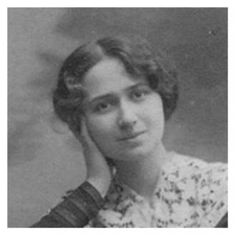Raissa Maritain Second notebook
The second notebook covers the period from 1918-1919 – the last year of World War 1. Early on Raissa writes about the vocation of a Christian which is to ‘walk on the waters … With no human support, in pure faith, in hope and pure charity. With no feeling sometimes, simply keeping one’s eyes raised to God …’
Despite being always in poor health Raissa journeys with Jacques to Rome in connection with his theological work, and there it’s initially more difficult to find the solitude and silence she needs. Once she can, she deepens her time of contemplative prayer, commenting on the necessity of this time of silence. This is alongside theological study, writing prose and poetry. Raissa sees that contemplation is the foundation of everything, for even if it dispenses with external activities and takes place in isolation it means that there is a stronger connection with others. She sees this as loving others more for God and ‘to esteem them much less in themselves. Their judgement matters little to me, at least fairly little. What matters to me from now on is to be with my God, and to learn to love him truly. To make his Love and his Mercy known, by becoming kind and merciful myself, by living only on his Love.’
God is in us she writes ‘by grace. It is a question of descending into ourselves, to the bottom of our soul, and that, once again, by sweeping away obstacles.’ She feels discouraged looking only at herself so vows to leave the care of herself to God and abandoning her attempts to do anything through her own strength she sees this as a form of surrender.
In her biography of Raissa, Judith Suther raises questions and gives the contradictory views held about Raissa Maritain. She sees that a physically frail highly intellectual woman living an unconventional life will always be the subject of criticism and divergent judgements. By various people seen as a saint, a snob, a hypochondriac, a genius or an eccentric. Her experience of having felt lost in her desire to be with God and her deepening sense of the joy of his presence meant that her spirituality carries an intensity and strength and this evoked strong feelings in others.
In 1919 she lays out in her journal her resolutions; these are just some of them:
self-examination every day at a set time; very frequent short and fervent prayer; total abandonment to God; free my heart from everything it clings to most …; consent to be completely inactive and useless better to allow God to work in me; be attentive to divine impressions; be attentive to all movements of my heart; see to the purity of intention of all my acts, to perfect sincerity.
And there are more …
